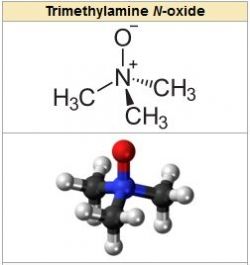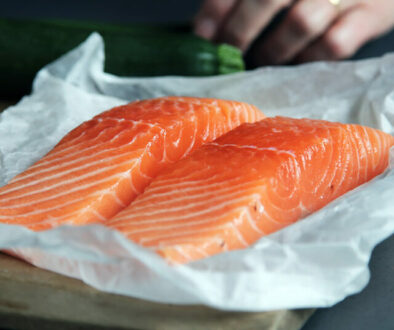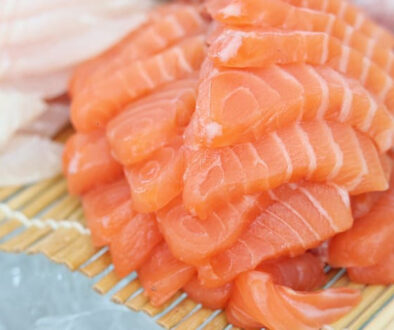Why Your Salmon Smells Fishy
“I want to eat salmon but it smells fishy and I hate it!”

The AHA (American Heart Association) recommends eating fish (particularly fatty fish) at least two times (two servings) a week. Fatty fish include one of my favorites, salmon. But what do you do if you have been trying to cook salmon and can’t stand the fishy smell and taste?
This time around we will talk about what causes salmon to smell fishy, how to avoid stinky salmon and at least one thing that you can do about it if the salmon you already have has started to smell fishy!
Why do salmon or any other fish smell fishy in the first place?

As part of the crew at Fishing PNW, I do a fair amount of salmon fishing and at least from time to time we pull in salmon fresh out of the water in the morning and have them for dinner that night. I can tell you that salmon should not have a fishy taste or smell. But far too often, Salmon that you buy leaves your kitchen with that dreaded fishy smell.
The reason for this is a chemical called trimethylamine N-oxide that scientists believe act as an anti-freeze and to protect a fish’s cellular proteins under the pressures they encounter in the deep. The problem starts after a fish dies.
After a fish has ceased to be, trimethylamine N-oxide starts breaking down into Trimethylamine. It is this chemical that causes the characteristic fishy smell you probably have experienced in a fish market before.
Prevention is key to avoiding salmon that smells fishy!
Now that you know that the fishy smell comes from a chemical that is too long to pronounce breaking down into one moderately more pronounceable, the key element in avoiding it is obvious. Buy fresher fish!
Even the freshest fish at the store has had to undergo the process of being caught, processed, frozen, thawed and displayed at your local grocers. Under the best circumstances it has been at above freezing temps for only a few days, but that is still long enough for trimethylamine N-oxide to start breaking down and stinking up your otherwise beautiful fish.
Find the busy fish markets and avoid ones that look questionable. Don’t be shy about asking to smell the salmon or other fish before you buy it. If it smells fishy in the store, then it won’t be any better by the time you take it home.
A good alternative to trying to track down ‘fresh’ fish, consider commercially prepared frozen fish. You may be surprised to know that much of the fish at the store has been previously frozen. Wild-caught, flash-frozen fish like you can get from Wild Alaska is as fresh as you can get it. These fish go almost immediately from the water to a processing ship where they are flash-frozen and remain frozen until you thaw it out at home.
Take care of your fish before you cook it!
Ever notice how the meat counter is usually one of the first stops when you wander through a grocery store? You should consider how that trek through the grocery store and then the ride home might affect your fish. Does all that time warming up in the cart, and on the ride home is not good for its flavor and is contributing to it having that fishy smell.
I suggest making the stop at the fish counter your last stop before you check out. You may even want to bring along a small cooler or cold bag with a cold pack in it do keep your fish in on the ride home.
This may sound extreme, but considering that the fishy smell we are trying to avoid is the breakdown of chemicals, the colder we can keep our fish, the slower that process will be and the less fishy smell your salmon will have.
Lastly, try and buy fish the same day you are going to cook it. At most I would buy it the night before and keep it at the bottom of your fridge where it is coldest.
What can you do to eliminate that fishy smell?
If after all your salmon still smells fishing when you go to cook it, one thing you can do is drizzle it down with lemon juice. Lemon juice is acidic and actually converts the volatile chemicals in the amines to a much less volatile salt. The effect of this is to bind up the stinky chemicals into a form you don’t smell and taste as much.
No more salmon that smells like fish for dinner!
I hope this article has been useful to you in realizing that salmon should not be fishy tasting or smelling. Good fresh salmon tastes sweet and quite honestly, like salmon. There is no other way to describe it. The simple way to avoid smelly salmon is to shop more carefully, smell fish before you buy it, keep it cold during transport, and to store it right at home.




7 Shockingly Common Mistakes People Make When Cooking Salmon - Good Salmon Recipes
April 11, 2023 @ 12:51 pm
[…] Why Does Your Salmon Smell Fishy? […]